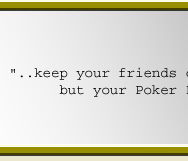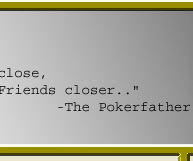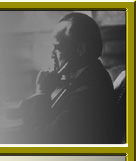Copyright 2010 Full
Tilt Poker
May 17th, 2010
(View all Online
Poker Lessons)
Poker Lesson: Heads-Up PLO
Author: Brandon Adams
Because Pot-Limit Omaha is a game where the nuts can – and often do – change on every street, many players can’t go too wrong by playing a super tight strategy at a full table. This means being highly selective before the flop and limiting your range to something like the top 15% of starting hands, and then only continuing after the flop if you have a very strong draw or a made hand.
When the game gets short-handed or heads up, however, this strategy simply won’t work. In these situations, you can go very wrong by playing too tight and giving your opponents too many easy opportunities to steal pots through pre-flop raises and post-flop continuation bets. In short, you’ve got to play more hands overall, more marginal hands, and play them more aggressively, in order to succeed in heads-up play.
Let’s look at a situation where someone may be holding a hand like 10-8-A-2 double suited and the flop comes 10-8-2. At a full PLO table, this is a spot where many inexperienced players are likely to go broke because their instinct is to put as many of their chips as possible into the pot with their "big hand". The thing is, while top two pair may in fact be the best hand in this situation, it’s unlikely to hold up against multiple opponents because there are just too many ways to get beat from sets or big draws to straights, flushes and full houses.
Heads up, on the other hand, is a completely different situation. Say you’re holding the same hand and see the same flop described above. Because aggression is such an important part of heads-up play, getting your chips into the middle with what’s likely to be the best hand now makes sense. Because you’re playing Omaha, it’s likely that your opponent may still have a big draw so getting your chips in accomplishes two things – it pumps up the pot when you’re likely to be ahead and prevents your opponent from improving his hand for free.
Of course, there’s more to an aggressive heads-up style than just jamming when you’re holding a made hand. In Omaha, especially, you need to play a much more aggressive pre-flop game when you’re heads up than you would otherwise. Because of the size of the blinds when you’re heads up, experienced players will often raise relentlessly from the small blind (the button), simply because the pot odds are so good. This becomes especially true against opponents who don’t open up their games and who are just looking to peddle the nuts with premium hands.
If you’re willing to raise consistently from the small blind against a tight opponent and then back that up with a pot sized continuation bet after the flop – whether you connect or not - you can show a profit as long as your play works just half of the time. If your opponent does play back at you before the flop, you can assume he’s got a big starting hand like Aces or something like 9-10-J-Q double suited, which helps you define the strength of your hand after the flop. If, on the other hand, he calls you before the flop and then calls or raises after the flop, you can again assume he’s holding a big hand and proceed with caution.
Against tight or scared opponents, it’s not very hard to succeed with an aggressive style once you’ve gotten comfortable with the concept of pushing the action with what, at many times, is likely to be a marginal hand. Against more experienced and aggressive opponents, however, this can be a more intimidating proposition. While these players are more likely to play back at you before the flop, this doesn’t mean that you need to give up your aggressive approach, though you should probably consider tightening up after the flop if you haven’t connected or haven’t connected very strongly.
Say you flop two pair on a board of A-4-7 with two clubs. Your opponent checks, you bet, and then get check-raised. What do you do? The answer really comes down to your read and your previous experience with your opponent throughout the course of the match. Do you think he’s drawing? Bluffing? Would he re-raise with nothing or is he looking to get you to make a bad call when you may already be drawing dead?
With nothing stronger than two pair here, the question becomes, "What hands can I beat that play this way?" Unless you put your opponent on nothing better than a draw, the answer is probably "Not much", and the safest course of action is probably to fold and look for a better spot. Again, though, the decision here really comes down to your read of your opponent and how strong you really think he may be.
In short, the key to succeeding in heads-up PLO is to loosen up your game and play more hands both before and after the flop while also keeping track of how your opponent is playing in relation to you. Remember, tight is right at full tables, but aggression is what pays off when you’re short handed.
Full Tilt Poker Bonus

Downloaded from
the World Wide Web on May 17th, 2010:
http://www.fulltiltpoker.com/pro-tip/BrandonAdams/224 |








